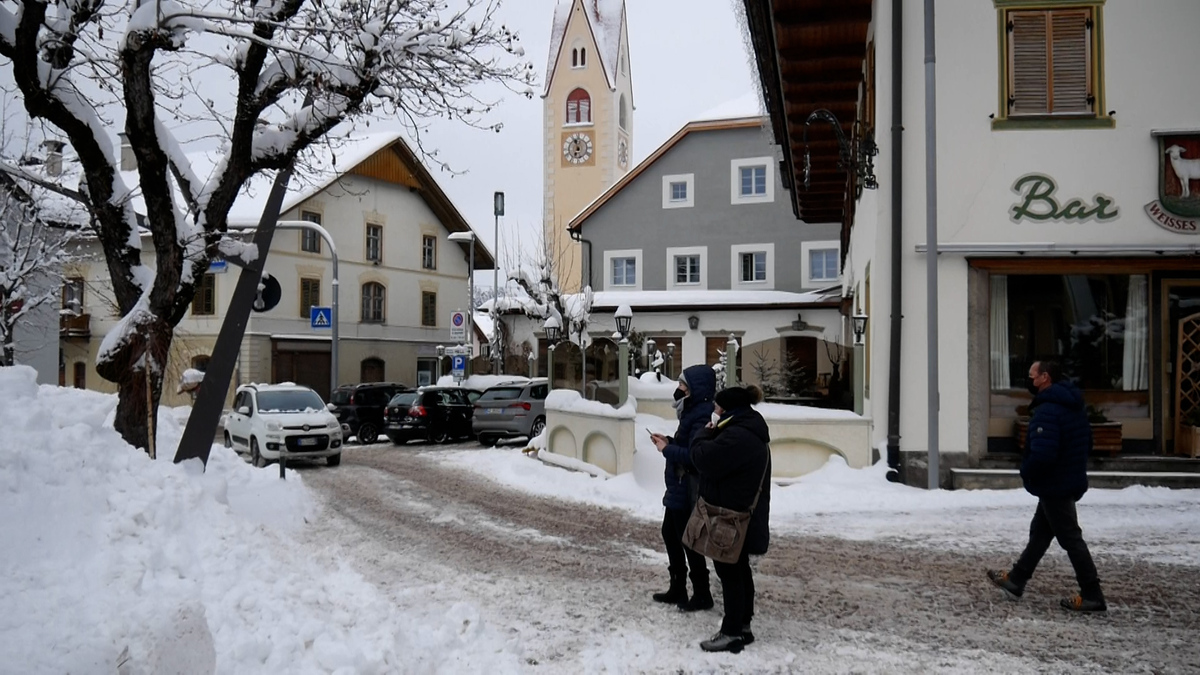03:15

The South Tyrol province in northern Italy has by far the country's highest COVID-19 infection rates and, at the same time, one of its lowest vaccination rates.
While the government introduces tougher restrictions for the unvaccinated, some in South Tyrol who are against vaccinations, or "anti-vaxxers" as they are known, are responding with extreme measures: contagion parties, where a COVID-19-positive person is invited to intentionally infect others.
"One person takes someone else's chewing gum, the other drinks from someone else's beer glass." According to South Tyrolean bakery saleswoman Maria Lamp, this is how the infamous contagion parties are happening in the mostly German-speaking province.
"Those who are totally against vaccination and refuse to get tested, they are all getting intentionally infected at the moment – yes, even in our area here. I know some of them," she told CGTN.

Maria Lamp says she knows people who share chewing gum and beer glasses at 'contagion parties.' /CGTN Europe
Maria Lamp says she knows people who share chewing gum and beer glasses at 'contagion parties.' /CGTN Europe
But why? According to Roberta Vanzetta from the regional health authorities SABES, the aim of these contagion-partygoers is to get a certificate of recovery, which will grant them access to restaurants and bars. But several of them have ended up in hospital.
"I think they're absolutely reckless people who don't realize the grave danger they pose both to themselves and to the people who come in contact with them."
Vanzetta is glad the police are starting to tackle the gatherings: "Those who have been caught have received fines."
Welsberg-Taisten is one of the most troubled villages in South Tyrol. With a seven-day incidence of 1,000 new cases per 100,000 people, the infection rate here is six times higher than the national average.
Meanwhile, vaccine skepticism is high. In neighboring villages, an estimated 50 percent of the population has received the COVID-19 jab.
"The low vaccination rates in some of our communities also depend on whether the family doctors support the vaccinations or not and whether there are organized anti-vaccine groups," Dominik Oberstaller, the mayor of Welsberg-Taisten, explains.

Roberta Vanzetta from the regional health authorities says people are being 'reckless.' /CGTN Europe
Roberta Vanzetta from the regional health authorities says people are being 'reckless.' /CGTN Europe
South Tyrol currently has the highest rate of intensive care bed occupancy in Italy and is struggling with staff shortages. Since April, medical personnel are subject to mandatory vaccination and, as a result, many unvaccinated nurses have been suspended.
"With a reduced nursing staff, we now face an increasing number of hospitalizations," Vanzetta warns.
However local opposition politician Werner Straudi from the South Tyrolean Freedom party says the government is at fault by not providing more intensive care beds and sufficient staff.
"I wonder whether Italy is not cutting into its own flesh with compulsory vaccination. Because you can't force people. I know many nurses who, for example, have been suspended from retirement homes."
Straudi is not vaccinated and his social life has been greatly curtailed by recent restrictions. "I'm not allowed in any bar, nowhere. I'm only allowed to go to work and test myself dutifully every two days, at my expense. It's already a lot that they let me work. If they forbid that as well, I don't know if there will be an uprising."
While the number of hospitalizations is continuing to rise, South Tyrol is now calling for mass vaccinations – 80,000 slots are available this weekend to bring the region's low vaccination rate in line with the rest of the country.

